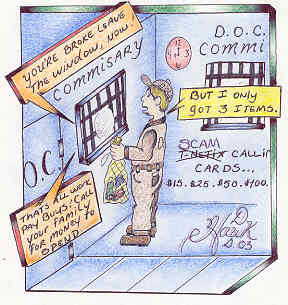By Todd A. Heywood | 03.30.10 | 7:31 am
Michigan Messenger
LANSING — Under a budget proposal released by the Michigan House GOP last week, prisoners housed in the Michigan Department of Corrections would see their pay for work and educational assignments eliminated, and an increase the fees assessed for phone calls. Advocates for prisoners call the move “immoral” and the MDOC says it opposes the plan.
Under the proposal, the state would eliminate $11 million in prisoner pay, and raise an additional $4 million by charging prisoners more for phone calls.
The prisoner pay policy (pdf) on the MDOC website shows prisoners are paid anywhere from 17.5 cents an hour to $1.24 an hour. Some prisoners are eligible for pay of $3.29 per day to $3.34 per day.
John Cordell, an MDOC spokesperson, says prisoner pay is important to making prison life “more tenable.”
“It gives them a little bit of spending money,” Cordell said. “It allows them to buy some extra goods through their prisoner store.”
Those items include food items and writing supplies. The prisoners are also allowed to use money in their accounts to purchase goods through “approved vendors.” Those goods can include tennis shoes and clothing, says Cordell.
“[If that pay is eliminated] then the state may be subject to that expenditure. That would be a greater loss [budget wise],” Cordell said.
Cordell said the money spent in the prisoner stores are then used to finance the store operations, as well as other prison related expenses such as purchasing new recreation equipment and paying for cable or satellite costs.
State Rep. John Proos (R-St. Joesph) called Cordell’s argument a “misnomer.” He said the legislature would be very willing to shell out $250,000 for exercise equipment in order to save the state $11 million in prisoner pay.
Asked if the MDOC supported the budget proposal Cordell said he had not discussed it with the administration of the department, but he said he “doubts” it would garner support.
He also said that there are other good reasons to maintain the program. “It provides an incentive for our prisoners to work or go to school,” Cordell said.
Penny Ryder, co-director of the Criminal Justice Program of the American Friends Service Committee in Ann Arbor, says that the prisoner pay is about more than “incentive.”

A prison reform conference at Plymouth Congregational United Church of Christ included a panel of prison reform advocates representing various agencies accross Michigan. Left to right: David Tjapkes, Penny Ryder, Kay Perry, Miriam J. Aukerman and David Moore. Photo by Bethany Duemler
“The prisoners definitely need to have meaningful work. One of the big issues for many prisoners is that they never had a work ethic,” Ryder explained. “In our culture a work ethic is tied to some form of compensation. [Eliminating the pay] would be equating them with slaves again, and many of the prisoners are African Americans, and it doesn’t provide an appropriate philosophy in terms of the work ethic. We try to get them to understand that they need to put in a good day’s work for their pay.”
Ryder says her group encourages prisoners to save their payments for their eventual release. But she said they find many spend their money on food from the prisoner store because the prisoners don’t like the food served in the “chow hall.”
“Some prisoners have put their children through college — or helped put them through college — with the money they have earned, little by little with the work in prison,” says Ryder. “And they should be allowed to do that.”
“We are built on the idea of being a capitalistic society,” says Ryder. “We should show that standard and acknowledge that standard for prisoners’ work.”
Rep. John Proos, Minority Vice Chair of the House Appropriations Corrections and Human Services Subcommittee, said he takes Ryder’s views “very seriously.”
“I would not disagree with that perspective at all,” he said, “but during these extraordinary times, we have to make tough cuts.”
He said he would like to see the committee hold a hearing about the proposal to eliminate prisoner pay, so that the committee could fully hear the perspective of Ryder and her program. He said that in doing so the public may better understand the importance of the program and how it reduces recidivism.
Prisoner pay rates have not been increased in “at least” 10 years, Ryder said. And her group has been advocating for an increase, not an elimination or reduction. She notes that while prisoner pay rates have stagnated, costs in the prisoner store and for approved items from approved vendors has increased.
A second proposal would reinstate a surcharge on all phone calls from prisoners. The GOP plan says the surcharge would raise an additional $4 million. But exactly how much that surcharge would be was not detailed.
Proos said he could not recall what the original surcharge was, nor could he recall what the surcharge was that was used to calculate the $4 million revenue stream. But he said it was a conservative estimate based on technology, the former surcharge rate, and the cost of bidding the phone service out to a third party. The last of those items, he said, was particularly difficult and is currently undergoing a bidding process.
He called the surcharge a “significant” revenue generator for the department. He sad the item was eliminated in the 2008-2009 budget, at the insistence of Rep. Alma Wheeler Smith (D-Salem Twp.).
“It’s an argument Chairman Smith made and it’s one she won on a public policy debate,” said Proos about the earlier elimination of the surcharge.
The GOP plan noted that when the surcharge was being charged to prisoners it resulted in a $10 million revenue stream to the state. Again, specifics of the surcharge at the time were not included in the plan.
But Ryder says the move to start the charge over again was “discriminatory.”
“We believed it was discriminatory. It unfairly targets a class of people and if you communicate with that class of people, you are gouged,” said Ryder. “I believe it is totally immoral and unethical for the state to try to bring in a tax for something like this.”
The charge, Ryder says, has been an unfair burden in years past. She said some family members, eager to continue communications with their loved one, racked up huge phone bills in the process. She said some families ended up declaring bankruptcy as a result.
“We fought and fought for years to get the cost of a telephone call down to where it is because we know communication with the outside world is very important,” Ryder said. “In some situations making telephone calls is necessary and with the focus on re-entry all studies have shown that a contact with a family is extremely important in the recidivism rate going down.”







